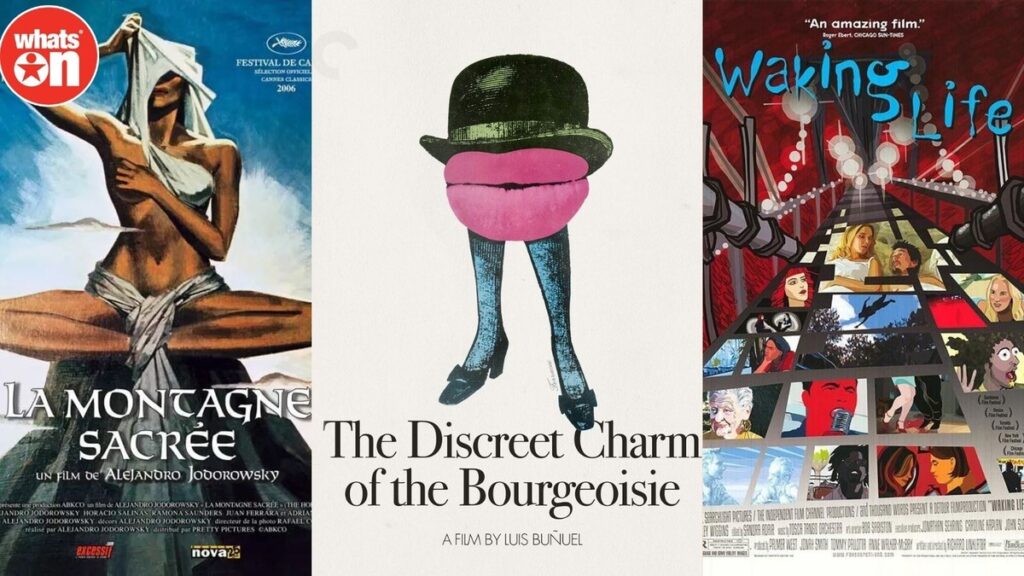Film Friday: Top 7 Must-Watch Social Surrealist Films explores powerful cinema that blends dreamlike imagery with hard-hitting social critique.These unforgettable films combine surrealist storytelling with biting social commentary—from class struggle to state control. A must-read guide for fans of social surrealism, alternative cinema, and anyone seeking bold, thought-provoking films that reflect society through a dreamlike lens.
1. The Discreet Charm of the Bourgeoisie (1972) – Luis Buñuel
Luis Buñuel’s satirical masterpiece tears into the hollow rituals of the upper class. The plot follows a group of bourgeois friends who repeatedly try—and fail—to have dinner together. Dreams blur with reality, and political messages hide behind absurdist humour. It’s a sharp critique of consumerism, colonialism, and elite hypocrisy, all filtered through a surreal, often nightmarish, lens. Buñuel dismantles capitalist comfort with gleeful elegance, making it a landmark in social surrealism.
2. Brazil (1985) – Terry Gilliam
Terry Gilliam’s Brazil is a dystopian epic wrapped in Kafkaesque bureaucracy and Orwellian terror. A low-level office worker dreams of rebellion in a world run by a soulless, malfunctioning state. Rich in absurd visuals—ducts, pipes, and paper trails fill every frame—Gilliam critiques government control, consumer culture, and identity loss. This darkly comic vision of a broken society still feels eerily relevant today.
3. Songs from the Second Floor (2000) – Roy Andersson
Roy Andersson’s Swedish gem stitches together surreal vignettes of grey, disillusioned urban life. Inspired by Kafka and T.S. Eliot, each frame is a painterly, static tableau of absurdity—businessmen self-flagellate, and ghostlike figures wander without purpose. Andersson’s humour is deadpan but deeply political, exposing the emotional decay beneath consumerism and capitalism. It’s haunting, hilarious, and painfully human.
4. The Holy Mountain (1973) – Alejandro Jodorowsky
Jodorowsky’s The Holy Mountain is a psychedelic odyssey of religious, political, and capitalist critique. A Christ-like figure joins a mystical journey with alchemists and planetary archetypes, aiming to reach immortality on a sacred mountain. Surreal visuals—animal sacrifices, mannequins, and absurd symbols—push boundaries, challenging Western values, greed, and control. It’s radical, unforgettable, and deeply rooted in spiritual and social revolution.
5. Eraserhead (1977) – Directed by David Lynch
David Lynch’s feature debut is a harrowing journey into anxiety, alienation, and the oppressive machinery of industrial life. Shot in stark black-and-white, Eraserhead presents protagonist Henry Spencer as he navigates a bleak, nightmarish world of deformed infants, barren cityscapes, and decaying interiors. The film mirrors the overwhelming fears of fatherhood, the breakdown of communication, and the horror of societal expectations.
With barely a linear narrative, Lynch uses absurdity, haunting sound design, and surreal visuals to evoke the psychological effects of social and emotional suffocation in modern life. It’s not just weird for weird’s sake—Eraserhead is a symbolic exploration of working-class dread, domestic paralysis, and existential despair that remains one of the most disturbing and influential works of social surrealism.
6. Teorema (1968) – Pier Paolo Pasolini
In Teorema, a mysterious young man visits a wealthy Milanese family, seducing each member before vanishing, leaving them spiritually unravelling. Pasolini merges biblical allegory with Marxist thought, using surreal disruption to attack bourgeois values. Every character descends into existential crisis, and the family’s house—a sterile, modernist symbol of wealth—becomes a hollow shell. It’s a poetic, unsettling journey through faith, sex, and social order.
7. Waking Life (2001) – Richard Linklater
Richard Linklater’s Waking Life explores dreams, consciousness, and the human condition through rotoscope animation and philosophical dialogue. While less overtly political than others on this list, its surreal flow of shifting realities invites a deeper reflection on free will, alienation, and society. Conversations touch on anarchism, existentialism, and mass media—all with a dreamlike detachment. It’s like wandering through a thinking mind mid-dream.
For more Film Reviews, visitWhatsOn.guide

